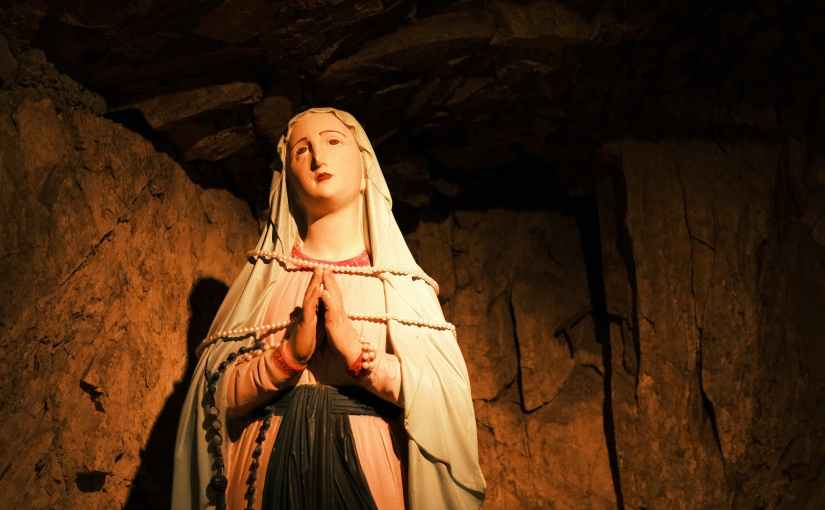Our Gospel reading today features one of the greatest songs of worship ever known. It is a beautiful, and heartfelt response by Mary to all that God was going to do for the world through her, and a powerful reminder that the Lord truly is with us and how he fulfils his promises. Mary demonstrates a living, vibrant and genuine faith, and her words, known as the Magnificat, continue to be an inspiration to all believers’ centuries later.
To set this amazing song in context, we should remember it comes soon after the birth of Jesus is foretold by the angel Gabriel. Mary and Elizabeth have very different stories to tell. Elizabeth’s pregnancy with John the Baptist took away the shame of her infertility. Whereas Mary’s pregnancy potentially brought shame on her since she was out of wedlock. But how does she respond to that encounter with one of God’s messengers and with her subsequent encounter with Elizabeth? Trusting completely in God, she takes everything that has been said in faith and gives all the glory back to Him. She’s praising God because he has “looked with favour on the lowliness of his servant.” With Mary it is never a case of me, me, me…it is a case of him, him, him. Listen again to what she says (and this version taken from the Message Bible translation):
And Mary said, “I’m bursting with God-news; I’m dancing the song of my Savior God. God took one good look at me, and look what happened— I’m the most fortunate woman on earth! What God has done for me will never be forgotten, the God whose very name is holy, set apart from all others. His mercy flows in wave after wave on those who are in awe before him. He bared his arm and showed his strength, scattered the bluffing braggarts. He knocked tyrants off their high horses, pulled victims out of the mud. The starving poor sat down to a banquet; the callous rich were left out in the cold. He embraced his chosen child, Israel; he remembered and piled on the mercies, piled them high. It’s exactly what he promised, beginning with Abraham and right up to now.”
I love how Mary almost seems to explode with joy. She goes on to point out all of God’s good deeds. She gets it…she knows her Scriptures. It is her ‘Emmaus Road’ moment when everything she has ever heard in Scripture makes sense. Isn’t it incredible that this simple young woman could speak such insightful and inspiring words? Mary’s words are words from the heart, as her spirit rejoiced in adoration and worship of an almighty God. Mary had had opportunity to reflect on everything that the angel Gabriel had told her, and her joy overflowed. There is no pride or vanity in her words; she acknowledges the poverty of her heart and spirit; “he has been mindful of the humble state of his servant.” Pride comes through our refusing to accept our dependence on God and refusing to accept His gifts. Humility is gratefully accepting those gifts and using them to bring glory to God. The insight with which Mary speaks demonstrates a depth of understanding that could only have come from the Holy Spirit being at work within her and the inspiration that He brought. God was at work, equipping her for the charge that she had been given. All through the salvation history of God’s people, he has chosen the least likely…not because they were great or powerful or gifted or talented, but quite simply because he loved them. He loves us too, just as he loved Mary.
We are reminded of this in 1 Corinthians which tells us “not many of you were wise by human standards, not many were powerful, not many were of noble birth. But God chose what is foolish in the world to shame the wise; God chose what is weak in the world to shame the strong; God chose what is low and despised in the world, things that are not, to reduce to nothing things that are, so that no one might boast in the presence of God He is the source of your life in Christ Jesus, who became for us wisdom from God, and righteousness and sanctification and redemption, in order that, as it is written, “Let the one who boasts, boast in the Lord.””
I know so many people who don’t think that they are good enough. People who think that they are inferior or unworthy or underserving. But this morning think about Mary, the disciples and so many other people who God chose. God chooses people who are like that. If you sometimes feel that you aren’t good enough, know that God chooses people just like you. I pray this morning that just like Mary, you might also have that ‘Emmaus Road’ kind of moment when the extent of God’s love and grace really connects with you. When your soul might also magnify the Lord and your spirit rejoice in God your saviour – a God who is with you to the end of the age. I am truly inspired by Mary’s words. If you get time, revisit this passage often. Meditate on her words. Allow Mary’s words to inspire you and strengthen your faith – faith in a God who wills to act in sinful world, to save it, and to redeem it. In your quiet time, as you still yourself and come into God’s presence, what song of worship would you want to proclaim from your heart? How might the Holy Spirit at work in your life inspire you? If you have chance, as you try reading this passage again why not try to write your own declaration of truth, your words of worship and gratitude, your love letter to God. Amen






